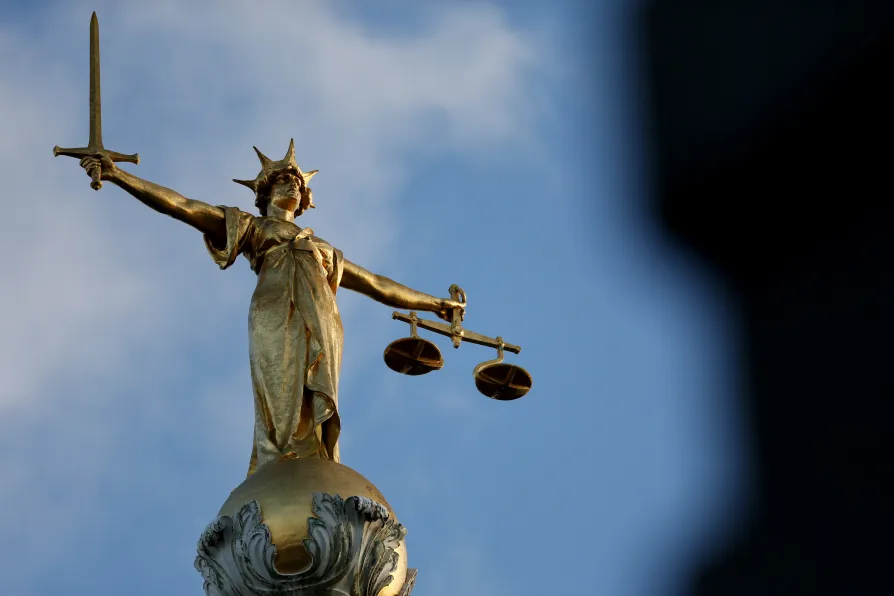
 FW Pomeroy's Statue of Justice standing atop the Central Criminal Court building, Old Bailey, London
FW Pomeroy's Statue of Justice standing atop the Central Criminal Court building, Old Bailey, London
PROPOSALS to restrict the right to trial by jury are presented as the only way to salvage a system in crisis.
Former judge Sir Brian Leveson says we must act to avoid “total system collapse.” The backlog in court cases is huge — 77,000 cases await trial in the Crown Court — and Leveson is right that leaving defendants and victims of crime waiting years can have a terrible impact on their lives.
But these are dangerous proposals which must be seen in context: firstly, of the cuts to justice budgets from 2010 onwards, and secondly, of the increasing authoritarianism of the state and the courts which is already undermining jury trials.
The Cameron-Osborne government’s cuts are directly responsible for today’s backlog in court cases.
Austerity’s impact is usually talked about in terms of the biggest and most visible services, such as the NHS and education. But in sector after sector cuts have crippled the capacity of state agencies to function. This is certainly true of the courts.
Ministry of Justice budgets were slashed by a third through the 2010s. A report this year by the Institute for Fiscal Studies found spending, in real terms, now 24 per cent lower per head of population than in 2008.
The Conservative-Liberal Democrat coalition slashed access to legal aid, leading to an 82 per cent drop in the number accessing it within five years. Not only has this further biased courts towards those who can afford the best lawyers, but it has slowed them down: self-representing litigants often need to be walked through the law by judges.
Legal aid cuts have also reduced funding for criminal cases, with criminal law already a poor relation of corporate or tax law, paying its lawyers a fraction of the amount. As the Law Society put it last year, this “has resulted in a chronic shortage of judges and lawyers.”
Court buildings have been sold off, like so many other community assets: England and Wales lost nearly half their court buildings between 2010 and 2018. Initially sold for austerity savings, the sell-offs are now badged as about modernisation and bringing in new technology: a rationale we’ve seen deployed elsewhere to justify cuts to people and real estate, such as the NHS.
This backdrop explains why we now risk “total system collapse.” The answer is a reversal of austerity, not attacking jury trials.
Yet ministers may have other motives. As Tim Crosland of Defend Our Juries has warned, authorities are increasingly wary of the way a “jury of one’s peers” — that is, of randomly selected ordinary people — tends to resist political instruction and acquit defendants for actions they deem morally justifiable.
Judges have resorted to ordering defendants not to explain their actions, even banning references to climate change in court in some cases involving direct action by environmentalists.
Removing the right to a jury trial entirely from a swathe of offences increases the state’s power to shape prosecution outcomes.
One of Leveson’s suggestions is to remove the right to choose a jury trial in cases where the maximum sentence does not exceed two years. A government amendment to its Crime and Policing Bill, designed to increase the penalties for breaching police restrictions on protests, imposes sentences of up to 11 months on organisers.
It is not hard to see why a government determined to crack down on protests representing majority opinion, as the Palestine demonstrations do, might want to stop protesters putting their case to a jury.
Leveson urges a significant curtailment of our rights, painting it as necessity because an underfunded system is falling apart.
So our defence is bound up with the wider fight over public spending. As with our schools and hospitals, we need to spend more to undo the damage of the Tory years.
Defeating Rachel Reeves’s “fiscal rules” is not just about welfare. It’s about democracy.

The government’s case for abolishing most jury trials doesn’t stand up to scrutiny, argues KIM JOHNSON MP – and it must be stopped before it does lasting damage to democracy

ANSELM ELDERGILL examines the government’s proposals to further limit the right of citizens to trial by jury











